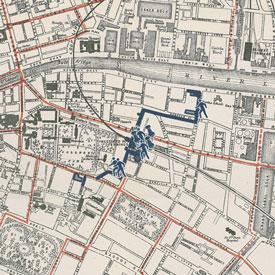The MediaKron Project: A Proprietary Digital Instruction Platform

Just this month, it was announced that MediaKron, a proprietary online tool developed at Boston College for presenting and exploring multimedia course content, will be expanding to six other colleges and universities: Boston University, Bucknell University, Clark University, Dartmouth College, Providence College and Worcester Polytechnic Institute.
MediaKron was started in 2006 by a team of faculty and designers in Boston College's Instructional Design and eTeaching Services Department. It has received $500,000 of funding from the Davis Educational Foundation. According to the MediaKron's self-description, "It provides an easy way for instructors to upload and organize a variety of instructional materials and enables students to explore this content from a web browser. Each object entered into the database can have a variety of metadata attached to it, including topics, tags, geographic location, and date. Each type of metadata corresponds to a different interface in MediaKron, enabling instructors to create variety of pathways for organizing content. Topics create sequentially ordered slideshows, tags enable items to be flexibly grouped with several different kinds of related items, locations allow items to show up on a map, and dates put items on a timeline to create a visual representation of chronology. In this way, multiple relationships can be created among items and users have control over viewing content differently as they navigate through the interfaces, filtering content in a variety of ways."
In other words, MediaKron allows faculty to build customized websites for courses or projects that utilize numerous tools for data management and display--maps, timelines, graphs, etc. that arrange (or rearrange) graphic, text, audio, and video sources into dynamic, informative presentations. MediaKron is designed to be a secure, closed space within which faculty can work. Because it is proprietary, it's platform and programming is not openly available to outside users; they must license it.
MediaKron currently boasts some 35 active projects. These are primarily in digital humanities, but they cross into topics such as biology, bilingual education, the history of public health, etc. Following the "Showcase" link on the website, visitors can preview image captures of some of the projects created using MediaKron. Additionally, following a hyperlink, visitors can see English Professor Joseph Nugent's Walking Ulysses Project; it grew out of a prototype started on the MediaKron platform.
In an article from boston.com, Boston College spokesman Ed Hayward explains both the proprietary nature of MediaKron and the dearth of open projects, explaining, "It's very much an internal teaching tool."
The fact that MediaKron is proprietary should not automatically lead us to dismiss it as a tool. Rather, we should pay attention to its ongoing development.
While there are other, open-source educational tools available (Drupal, Sakai, and Moodle pop to mind), and while many universities (UC Berkeley included) make concerted efforts to utilize open-source tools in the learning environment (the Townsend Humanities Lab uses Drupal), the announcement this month, that after a nation-wide request for proposals, BC's Office of Academic Technology invited faculty from six universities to use MediaKron to explore and create multi-media course content, is promising. Additionally, open projects such as the Professor Nugent's Walking Ulyssesoriginated in MediaKron before transferring to open spaces.
Put in other terms, though MediaKron is a somewhat enclosed environment and platform, we cannot be certain what openly available tools will emerge from it. If Walking Ulysses is any indication, what MediaKron makes possible will definitely be worthy of attention.
Sanjay Hukku is a Graduate Student Researcher at the Townsend Center for the Humanities.